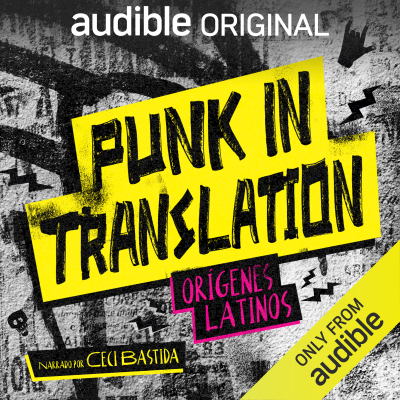Fresh ProduceClient Information
10 March, 2022Print

Secret Latinx History Of CBGB, Riot Grrrl, & Your Favorite Punk Rockers, Revealed: New Pod Out Today
Today, March 10th, the new audio-first entertainment company Fresh Produce Media and Audible are launching their first collaboration together, the new podcast Punk in Translation: Latinx Origins. Across eight episodes, released all at once exclusively as an Audible Original, Punk in Translation is Audible’s first production to be simultaneously published in both English and Spanish, and tells the stories of Latinx artists and Latin music’s overlooked role in the origins and evolution of punk.
Starting with ? and the Mysterians, the sons of Mexican migrant workers who became the first band ever described as “punk rock” in a music magazine, Punk in Translation: Latinx Origins takes listeners from New York’s CBGB to the East L.A. barrio to Tijuana, where the show’s host Ceci Bastida began seminal Latinx punk band Tijuana No!. Along the way, Bastida speaks with a who’s who of punk musicians from the ‘60s through the present day, including Joan Jett, Dead Kennedy’s Jello Biafra, Latinx punk icon Alice Bag, Blondie drummer Clem Burke, Downtown Boys’ Victoria Ruiz, and many more. Researchers, writers, and contributors to the series include producer Nuria Net (veteran Latinx music journalist, founder and former Editor-in-Chief of Remezcla), Latinx music expert and Billboard journalist Judy Cantor-Navas (who recently consulted on Encanto), The New York Times’ Isabelia Herrera, and other heavyweights from the fields of journalism, academia, and music.
In one episode, Chicana punk matriarch Alice Bag traces her journey from a violent household to the stage of Hollywood’s legendary punk club The Masque. In a different episode, Kid Congo Powers of The Gun Club and The Cramps talks about fighting to create space for queer punks in the scene. In another, pioneering Puerto Rican punk drummer and vocalist Rosie Rex tells her story of playing CBGB at the same time she was battling record company racism. The show also elevates newer artists, with Joan Jett describing how FEA carries on her legacy and Downtown Boys frontwoman Victoria Ruiz explaining how social activism and her roots in labor organizing help define her band.
See a complete episode-by-episode breakdown below, and let me know if you'd like to listen to the podcast or would be interested in coverage.
Punk in Translation: Latinx Origins is Fresh Produce Media’s first release to come of its first look development and production deal with Audible. It is one of many projects that have been greenlit for 2022.
Punk in Translation: Latinx Origins Episode Guide:
1: A Band of Outsiders
Latinx artists have been instrumental to the creation of punk music, even before it was called punk. In this episode, ? and the Mysterians’ guitarist Bobby Balderrama reveals the story of the “Mexican kids” from Michigan who performed on American Bandstand and ruled the charts.
2: “It’s a Cha Cha Rock”
Could a 1960s band from Peru be the original punk rockers? We’ll meet Erwin Flores, frontman of Los Saicos. Also - punk’s Latin roots go all the way back to the Cuban cha cha chá in a song that would become a punk anthem for generations to come: “Louie, Louie.”
3: CBGB’s Secret Latinx History
The show tells the story of Arturo Vega, the immigrant artist who designed the now globally ubiquitous Ramones logo. Listeners also meet pioneering Puerto Rican punk drummer and vocalist Rosie Rex, who was welcomed at legendary venue CBGB at the same time as she experienced racism at record companies.
4: Riot Girl Before Riot Grrrls
Chicana punk matriarch Alice Bag’s impact can be felt in later feminist acts like Bikini Kill and even viral sensation the Linda Lindas. In this episode, Alice traces her journey from a violent household in East LA to the stage of Hollywood’s legendary punk club The Masque.
5: The Chicano Punk Revolution
The show travels to the revolutionary East L.A. punk scene of the late 70s, led by Chicano punk rockers who embraced their Latinx roots, documented barrio life, and rejected stereotypes in their music; even at the expense of fame and fortune.
6: Proudly Queer, Latinx & Punk
Queer Latinx punks have been fighting for a more expansive, inclusive vision of the scene since its early days. The show meets Kid Congo Powers, a queer Mexican American kid from East LA who went on to form The Gun Club, and explored how intersectionality influences punk music.
7: Punk is not Dead: Latinx Punk Lives
Activism is inherent in Latinx punk today, with punkeros and punkeras inspiring and uplifting their communities and demanding change and justice.
8: Tijuana Sí!
Host Ceci Bastida takes a road trip home to what could be the most punk city in the world: Tijuana. On this personal and symbolic journey, Ceci talks to her Tijuana No! former bandmate Julieta Venegas about their rebellious teen years living by the border, rehearsing in the red light district, and going to concerts at Iguana’s, "the greatest, most dangerous venue that ever existed."
CONTACT
Hannah Schwartz
